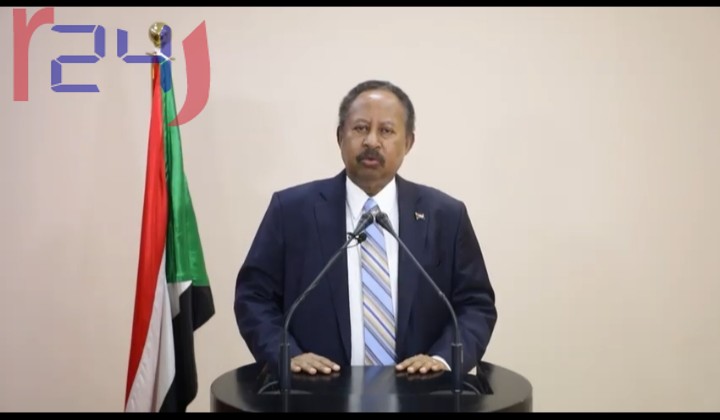Local and external circles are waiting the important and detailed
decisions that will be announced by the Prime Minister of the
Transitional Government in Sudan, Dr. Abdullah Hamdouk, within a week
from now, which will determine the political, economic and social path
of the transitional period.
Prime Minister Abdallah Hamdouk, addressed the Sudanese public in
particular and the world in general, one day ahead of thirtieth of
June marches , saying that there would be decisive and crucial
decisions that would be issued within fifteen days.
Some people who have spoken to Darfur 24, said that Hamdouk , was
commited to achieving a comprehensive peace, with the implementation
of justice and retribution to ensure that the crimes of the past
thirty years of the rule of the deposed Omar al-Bashir are not
repeated, and that he will also move towards combating the policies of
organized impoverishment that the citizen suffered during the rule of
the ousted president, by adopting policies a balanced economy that
guarantees development, fair distribution of resources, and basic
services for all.
Engineer Adel Khalaf Allah, a member of the FFC Economic Committee f,
which represents the political incubator of the transitional
government, said that the decisions expected to be issued by the Prime
Minister will include the demands made by the forces for freedom and
change, the resistance committees and the families of the martyrs,
expecting that these decisions will have a positive and expressive
impact on the Sudanese citizens.
Khalid told Darfur 24, that the economic demands of the people, are
represented in taking decisions to stop the deterioration of the
value of the Sudanese pound, which entails stability and a decrease in
the prices of basic commodities with their abundance
. Politically, Eng Adel, identified the demands in the form of
completing the structures of government, mainly, the appointment of
civilian governors.
Adel expected that an urgent decision would be issued to form the
legislative institution. He went on to say: “We cannot isolate the
weakness and slackening of the executive and central performance from
the legislative institution’s failure to perform its supervisory
role.”
He also expected a decision to speed up the formation of the special
courts to try affiliates of former regime, including court of coup
plotters of 30 June 1989, and other crimes committed during thirty
years, which is the period of military rule of the deposed Omar
al-Bashir.
Adel, who is the official spokesman for the Arab Socialist Baath Party
– one of the components of the transitional government – revealed that
among the demands received by the Prime Minister, was reconsidering
the formation of the Council of Ministers, due to the poor performance
of some ministers, and that they are not up to the aspirations of the
people.
The Baath party senior figure, cautioned that taking any decisions in
the political and economic affairs, without linking them to the
political and executive, will become pointless decisions.
The former regime and communist party:
Professor of political science at Bahri University, Mohamed Ahmed
Shaqila, agreed with what the prime minister said earlier, that some
will make these decisions an opportunity to take the country backward.
Shaqila told Darfur 24, “Certainly, these decisions will create
confusion. There are many against these decisions, especially the
elements of the ousted regime, given that they are against anything
the government does, and this is normal and understandable, along with
other organizations such as the Communist Party, Which is against the
free market system, raising support for its belief in the opposite
economic system, which is a socialist economy based on the state’s
complete domination of goods and services.
Professor Mohamed Ahmed , expected that the political decisions would
be related to the appointment of civilian governors and the
acceptance of separating religion from the state ,through negotiations
with the leader Abdulaziz Al-Helou.
As for the economy, it will be linked to the issue of lifting
subsidies on goods and services, considering that addressing the
economic crisis is based on an integrated package of policies that the
government has started to implement successively, including direct
financial support, raising wages, and raising partial support for some
commodities, especially fuel, and will move to lifting full support
for each Goods and services except health and education.
However, the political scientist, ruled out relieving of ministers
within the framework of the upcoming decisions of prime minister
Hamdouk.
The Sudanese people accepted the former UN staff, born in 1956 to
take over as prime minster, following the ousting of Omar Albashir in
a nationwide revolution in 2019.
Omar Albashir had ruled Sudan for thirty years , after overthrowing
the democratically elected government of Prime mister Alsadig Almahadi
in a bloodless coup in1989.

